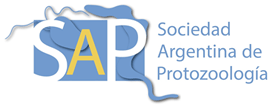
Post-doctoral positions available to study Calcium signaling in the apicomplexan parasite Toxoplasma gondii
 These post-docs will be part of the laboratory of Silvia Moreno to study Calcium Signaling in Toxoplasma gondii. The projects involve characterization of the role of specific calcium signaling proteins in the biology of T. gondii, and their expression and further physiological characterization using heterologous systems. These projects entail collaborations and training by Calcium channel experts and global analysis of calcium triggered signaling networks.
These post-docs will be part of the laboratory of Silvia Moreno to study Calcium Signaling in Toxoplasma gondii. The projects involve characterization of the role of specific calcium signaling proteins in the biology of T. gondii, and their expression and further physiological characterization using heterologous systems. These projects entail collaborations and training by Calcium channel experts and global analysis of calcium triggered signaling networks.
Ca2+ signaling regulates pathogenicity of apicomplexan parasites, which cause persistent mortality and morbidity worldwide through diseases including malaria, toxoplasmosis, and cryptosporidiosis. The phylum member Toxoplasma gondii infects >2 billion people worldwide. T. gondii is an obligate intracellular parasite whose replication and dissemination within its host are the main mechanisms by which it causes disease. Ca2+ signaling is central to T. gondii’s ability to complete its infection cycle and thus its resulting pathology. However, many of the molecular elements of the initial Ca2+ signals in T. gondii are unknown or uncharacterized. We seek to discover these molecules, specifically, the channels that enable cytosolic Ca2+ influx, through the plasma and intracellular stores membranes. There is very little information about the functional characteristics and roles of Ca2+ channels in T. gondii. Channels are critical for the successful unicellular life of parasites, and they could be targeted by many therapeutically useful agents.
Recent references from the lab:
• Márquez-Nogueras, K.M., Chasen, N. M. Hortua Triana, M.A., Kuo, I. Y. Moreno, S.N.J. (2021). Calcium signaling through a Transient Receptor Channel is important for Toxoplasma gondii growth. Elife, 10:e63417.
A comment about this work was published:
• TRP channels, the missing link for Ca 2+ tuning by a unicellular eukaryotic parasite?, Theopold U. and Barragan, A. Cell Calcium, 2021 98:102449
• Li, Z.H., King, T., Ayong, L. Vella, S. Chasen, N., Patel, S. Moreno, S.N.J. (2021). A plastid Two-Pore Channel that is relevant for organelle integrity and whole cell fitness. Nat. Commun. 12(1):5802.
A comment about this work was published:
• Ca2+ Signalling is a Conserved Game of Contact (2022). Casbolt, H. and Campanella, M. SAGE Journals Vol 5. Article Commentary. https://doi.org/10.1177/25152564221095961
• Vella, S.A., Moore, C.A., Li, Z., Hortua Triana, M.A., Potapenko, E. Moreno, S.N.J. (2021). The Role of Potassium and Host Calcium Signaling in Toxoplasma gondii Egress. Cell Calcium, 94:102337
• Herneisen, A.L., Li, Z.H., Chan, A.W., Moreno, S.N.J., Lourido, S. (2022) De novo mapping of the apicomplexan Ca2+-responsive proteome. Elife 11: e80336. doi: 10.7554/eLife.80336.
The Laboratory of Silvia Moreno is part of the CTEGD, a university-wide, interdisciplinary center that is home to approximately 24 labs that represent wide-ranging and comprehensive expertise in parasitology and tropical medicine and are among the largest groups of its kind in the world. Many of
these programs have major international on-site components for both research and training. https://ctegd.uga.edu/
The Training Program in Tropical and Emerging Global Diseases (https://training.ctegd.uga.edu/) is an NIH funded training program that offers post-doctoral fellowships to eligible candidates to train in CTEGD labs. The CTEGD at UGA is an exceptional place to do a postdoc with an invigorating and
supportive environment. Athens is a quirky, fun, small college town with a vibrant downtown nightlife, excellent restaurants, nearby mountains and rivers, and a very reasonable cost of living (http://www.visitathensga.com/)
To apply send a cover letter and CV including the names of 3 references to: Silvia N J Moreno, Professor of Cellular Biology. Email: smoreno@uga.edu
Web site: https://moreno-lab.franklinresearch.uga.edu/
